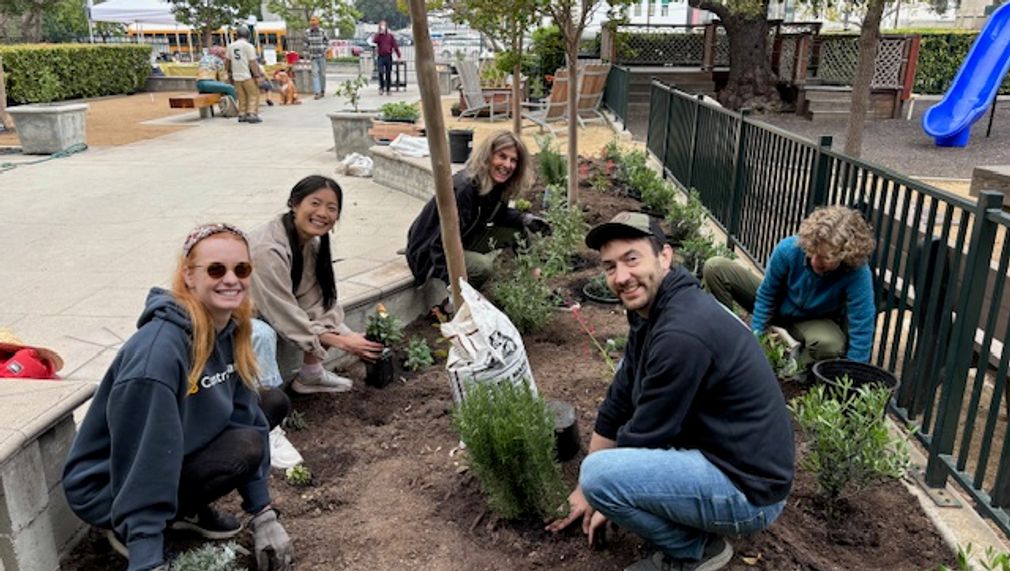Community Gardens & Urban Farm at the Cathedral
Integral to FCCLA's commitment to integrating ecological and equitable practices with spiritual wellbeing, our Community Gardens & Urban Farm grows organic, regenerative food for participatory community cultivation and distribution and organizes free classes in urban gardening & food security— composting, seed saving, food preservation, nutrition, and more. Providing fresh, nutritious foods for nearby food insecure and underserved communities, the project also serves as a teaching garden for students of Pilgrim School, located at FCCLA.

What is the primary issue area that your application will impact?
Food insecurity and access to basic needs
In what stage of innovation is this project, program, or initiative?
Pilot or new project, program, or initiative (testing or implementing a new idea)
What is your understanding of the issue that you are seeking to address?
FCCLA practices compassion, diversity, and inclusion while serving the needs of the community. Food insecurity, a well-known serious public health problem, is a major issue in neighboring Westlake and Koreatown. Typically, food insecure individuals lack access to fresh, healthy foods & instead find only foods high in calories, saturated fats, salts, and sugars. This diet puts individuals at increased risk for diet-related chronic conditions such as high blood pressure, obesity, type 2 diabetes, heart disease, stroke, and many forms of cancer. According to the Los Angeles Public Health department, 26.8% of LA County residents experience food insecurity. This condition is especially prevalent in Koreatown and Westlake districts, where, each week, approximately 35,000 people struggle with food insecurity. In response to this food insecurity crisis, FCCLA created Food@First three years ago distributing food items as well as hygiene kits, gifts for children, diapers and more.
Describe the project, program, or initiative this grant will support to address the issue.
The Food@First program has served 5,435 households, over 26,000 people. The majority served are Latinx and Korean populations; also Filipino, Chinese, Indian, Russian, and Ukrainian populations, among others. The Gardens & Farm augment our ability to provide fresh food to neighboring communities. We are installing 35-40 beds throughout 4-5 acres of the church grounds with a variety of culturally appropriate vegetables, herbs, berries, stone fruit, edible flowers, and medicinal plants. We are also planting assorted citrus, avocado, and apple trees, and a variety of vining beans. Our methods exemplify ecological, regenerative practices incorporating seed saving, composting, non-chemical fertilizers, integrated pest management, and other sound methods. Additionally, FCCLA offers free classes in farm and garden education—planting, harvesting workshops, seed saving, composting, cooking, and food preservation.These classes empower and teach skills for nearby households and communities to create their own home and community gardens and build food security and sovereignty. The program will also be an exceptional educational asset to the Pilgrim School, an independent day school located on church grounds. One of the most diverse schools in the State, 380 students (K-12) come from 50 different zip codes and 10 foreign countries. Enthusiasm has been extraordinary; people have asked for training to plant home gardens and neighbors have offered land for potential community gardens.
Describe how Los Angeles County will be different if your work is successful.
Providing food and teaching how to grow food in a sustainable manner in radically food insecure neighborhoods is a key ecosystem, a vital social service, and solution to hunger and poverty for the region, the city, and the State. FCCLA partners with the Peace and Healing Center in Skid Row to provide programs; we co-partner our Food@First program with Immanuel Presbyterian Church, and offer our gardens & urban farm as teaching centers for Heart of Los Angeles (HOLA), which provides underserved youth with a range of programs. The Gardens & Farm engages and builds community by addressing everyday needs and mental wellbeing, providing opportunities for contemplation, spiritual growth, and a safe social haven. This inter-sectoral program is a model for how religious institutions can integrate ecological, equitable practices with spiritual & physical wellbeing of all faith traditions and share their land and resources to feed, empower, and provide food equity to their communities.
What evidence do you have that this project, program, or initiative is or will be successful, and how will you define and measure success?
This new initiative, begun early this year, aims to complete the following: Install 35-40 beds throughout 4-5 acres of the church grounds with a variety of culturally appropriate vegetables, herbs, berries, stone fruit, edible flowers, and medicinal plants, and also plant assorted citrus, avocado, & apple trees and a variety of vining beans. We estimate that we will produce over 2,000 pounds of fresh, ecologically grown vegetables and herbs. Raised beds will be teaching gardens offering opportunities for neighbors to learn garden and farm skills ranging from seed saving, planting, weeding, composting, harvesting, and more. Additionally, we will plant 11 varieties of citrus lining the sidewalk in front of the church, outside of its gates, for neighbors to harvest. Free Community Classes will build community, provide agricultural literacy and ecological principles for neighboring communities. Vegetable and herb gardens will be classroom learning areas for the Pilgrim School students.
Approximately how many people will be impacted by this project, program, or initiative?
Direct Impact: 27,000.0
Indirect Impact: 500.0